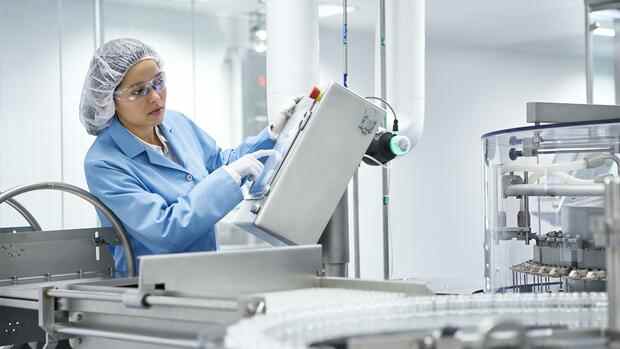Frankfurt As part of its efficiency program, the Fresenius Group wants to cut a total of around 2,000 jobs in the Kabi drug and nutrition division worldwide. The Handelsblatt learned this from corporate circles. The number corresponds to almost five percent of the jobs in this division. Fresenius Kabi employs around 42,000 people worldwide. According to the plans, around 250 jobs will be lost in Germany.
Fresenius did not comment on the numbers of job cuts when asked by the Handelsblatt. “The specific measures to implement the cost and efficiency program at Fresenius Kabi, which Fresenius announced some time ago, are currently being developed. The clear goal is to further strengthen the company’s competitiveness,” says the Dax group from Bad Homburg. The answer was that the possible effects on the Fresenius Kabi workforce are in constant contact with the employee representatives.
The Fresenius Kabi nutrition division is the nucleus of the company that was founded 110 years ago. Among other things, the division offers intravenously administered drugs, infusions and nutritional solutions for seriously and chronically ill patients, as well as the medical products required for administration.
The dialysis subsidiary Fresenius Medical Care announced last November that it would be cutting 5,000 jobs worldwide, including around 500 to 750 jobs in Germany. The Fresenius Dax group, with annual sales of EUR 37.5 billion and a profit of almost EUR 1.9 billion, has lost momentum in recent years and has had to partially reduce its profit targets.
Top jobs of the day
Find the best jobs now and
be notified by email.
Then there was the corona pandemic, which particularly affected the dialysis subsidiary Fresenius Medical Care (FMC). In total, Fresenius, which also owns the clinic group Helios, employs more than 300,000 people.
>> Read our balance sheet check here: Weak profits, burdensome dialysis division – why Fresenius shareholders need a lot of patience
Fresenius and the dialysis subsidiary FMC, which is also listed on the Dax, last year prescribed an efficiency program in order to grow more profitably. This means that the company is making faster progress than expected, Fresenius CEO Stephan Sturm reported to the shareholders at the Annual General Meeting in early May. For this reason, Fresenius has increased the savings target for the company’s subsidiaries beyond FMC: From 2023, the areas should save more than 150 million euros annually through the measures.
Kabi is the third largest Fresenius division
It is not yet known exactly where the jobs at Kabi are to be cut. The efficiency measures also include the optimization and concentration of production lines.
With sales of around 7.2 billion euros, Kabi is Fresenius’ third-largest division after the dialysis subsidiary Fresenius Medical Care and the hospital group Helios, and still delivers the highest EBIT margin at 16 percent. However, profitability has shrunk in recent years.
On the other hand, Kabi is considered the Fresenius division with the best growth and profit prospects, which plays a key role in Fresenius’ growth plans and in which investments should be made with priority, as Sturm announced when presenting the annual figures in February.
Fresenius Kabi has been managed by Michael Sen since April 2021. The former Siemens and Eon manager had been brought in to advance the division again. Last autumn, the new strategy for the division, Vision 2026, was defined. Kabi wants to focus on three growth paths:
- On the one hand, the range of clinical nutrition products is to be marketed more widely worldwide.
- On the other hand, Sen wants to expand with Kabi in the field of medical technology.
- In addition, the range of biotech products is to be expanded.
The company sees great development opportunities here in particular. Since 2017, Fresenius Kabi has also been active in the field of biopharmaceutical generic drugs (so-called biosimilars). At that time, the Bad Homburg company bought the biosimilars division of the Merck Group from Darmstadt for around 650 million euros.
Fresenius strengthens Kabi with acquisitions
The basic business with infusions and liquid medication, on the other hand, which accounts for around 50 percent of Kabi’s sales, is to be made more competitive overall – also through efficiency measures. For many years, this area had benefited from the competition’s delivery bottlenecks, which have now been resolved. That puts pressure on the margin, as do rebate agreements in China and price pressure in the US.
Fresenius is also strengthening the further development of the Kabi division with acquisitions. At the end of March, the company announced two deals:
- Fresenius acquires a majority stake in the Spanish pharmaceutical company mAbxience, which specializes in the manufacture of generic biological medicines.
- The healthcare group is also taking over the US medical technology company Ivenix, which has developed a new infusion technology.
In total, Fresenius is spending around EUR 710 million on the two acquisitions. There are also milestone payments. The transactions should make a positive contribution to the company’s profits from next year.
Fresenius has been under pressure on the stock market for a long time: the share has lost more than 50 percent of its value in the past five years. In the past three months, however, stocks have increased slightly again.
More: Weak profits, burdensome dialysis division: why Fresenius shareholders need a lot of patience
